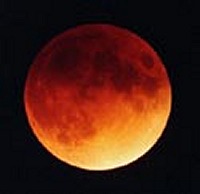 Lunar eclipse Saturday
Lunar eclipse Saturday
November 7, 2003
Friday - 12:30 am
On Saturday, Nov. 8th, the full moon will glide through our earth's
shadow producing a total lunar eclipse for skywatchers throughout
North America, Europe and Africa.
|

Lunar Eclipse
courtesy ESA
|
A total lunar eclipse
occurs when the Sun, Earth and Moon form a near-straight line
in space, so that the full Moon passes through Earth's shadow.
Unlike a solar eclipse, which requires special equipment to observe
safely, you can watch a lunar eclipse with unaided eyes.
The most impressive part starts
when the Moon's leading edge first enters the main shadow, or
umbra, and the partial eclipse begins. Over the next hour or
so, the Moon will slip into darkness. The total eclipse begins
when the Moon is fully inside the umbra, but it won't be completely
blacked out.
The totally eclipsed Moon should
still be visible as a dark gray or brown-red disk in the sky,
and this colour is caused by sunlight scattered in our atmosphere.
Its brightness depends on the amount of dust in the Earth's upper
atmosphere at the time, which influences how much sunlight filters
through.
The 'totality' phase of this
November's eclipse will be unusually brief, lasting only 25 minutes
because the Moon only just skims inside the southern edge of
Earth's shadow.
The eclipse will be seen in
its entirety by all of Europe and most of Africa late on Saturday
night. In North America, observers will see it earlier in the
evening, and those living in eastern and southern Africa, the
Middle East and southern Asia may see the eclipsed Moon set around
the time of sunrise on Sunday morning.
Nov. 8, 2003, Lunar
Eclipse Schedule
| |
Moon enters
Earth's shadow |
totality
begins |
totality
ends |
Moon exits
Earth's shadow |
| Universal
Time |
23:32 |
01:06
(Nov. 9) |
01:31 (Nov. 9) |
03:04 (Nov. 9) |
| Eastern
Time |
06:32
p.m. |
08:06
p.m. |
08:31
p.m. |
10:04
p.m. |
| Central
Time |
05:32 p.m. |
07:06 p.m. |
07:31 p.m. |
9:04 p.m. |
| Mountain
Time |
04:32
p.m. |
06:06 p.m. |
06:31 p.m. |
8:04 p.m. |
| Pacific
Time |
03:32
p.m. |
05:06
p.m. |
05:31
p.m. |
7:04 p.m. |
| Alaska
Time |
02:32
p.m. |
04:06
p.m. |
04:31
p.m. |
6:04 p.m. |
| Hawaii Time |
01:32
p.m. |
03:06
p.m. |
03:31
p.m. |
5:04
p.m. |
|
Read more about this lunar
eclipse:
Lunar Eclipse - Science @ NASA
Source of News and graphics:
European Space Agency
Web Site
NASA
Web Site
E-mail Editor: editor@sitnews.org
Post a Comment
-------View Comments
Submit
an Opinion - Letter
Sitnews
Stories In The News
Ketchikan, Alaska
|

